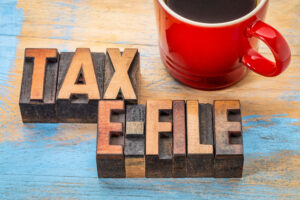How to get a Finnish IP address
The easiest way to improve your digital privacy is to switch your IP address using a VPN. We’ll …
Ahead of the April 15 deadline for filing US income tax returns, security companies and the US Internal Revenue Service are working at full speed to alert consumers about threats from phishing schemes, tax-themed malware sites, and identity theft tax fraud.
With nearly 100 mill ion Americans filing their taxes electronically each year, cybercriminals have a long target list of taxpayers to potentially defraud or steal identities from.
ion Americans filing their taxes electronically each year, cybercriminals have a long target list of taxpayers to potentially defraud or steal identities from.
Each tax season, consumers are targeted with phishing emails claiming to come from the IRS or a company preparing income tax returns. This year is no exception. As the IRS makes clear every year, they do not initiate contact with taxpayers by email to request personal or financial information.
The risk goes far beyond tax season. Many of the victims of online tax fraud have had their identities stolen before April. It’s just that to monetize these stolen personal details, the cybercriminals are rushing to file their fraudulent tax returns—using YOUR details– by the April 15 deadline.
Here is short list of the top five tips to avoid the dangers of tax fraud:
1. Be on the lookout for phishing. If you see an email from the IRS or Intuit, a major provider of income tax filing services, in your email inbox, don’t click. Phishing emails are the primary security risk for taxpayers in the spring tax season.
2. Get it straight from the IRS. Tax forms are best downloaded directly from the IRS site. And for other questions about taxes, go straight to the IRS site or a reputable tax accounting firm, not a site that pops up during a random browser search. This will reduce your risk of visiting a tax-themed malware distribution site by mistake.
3. Make sure it’s official. Most Americans submit their tax returns electronically via an e-filing site. To make sure that your e-filing site is for real, just check the official list of authorized e-filing spots on the IRS site.
4. Unsecured links sink ships. It is inherently risky to enter, email or text your personal details via an unsecured (HTTP) internet connection. Many web-mail services have only encrypted logins with the actual email messages remaining unencrypted. For greater security, use Hotspot Shield VPN to keep your data in an encrypted tunnel, safely hidden from anyone trying to eavesdrop on your internet activities. If you happen to be traveling or working outside the home and using a public WiFi network, such as at a coffee shop, hotel or airport lounge, your risks of getting hacked increase exponentially.
5. Malware may be looking to steal your data. Data-stealing malware infecting your computer and siphoning off financial and personal identification details is always a threat – and not just at tax time. To keep malware at bay, keep your antivirus programs up to date. With Hotspot Shield Elite, you can have an additional layer of protection because it detects and blocks over 3.5 million known and suspected infected web domains. Hotspot Shield will also block a malware bot already on your computer from contacting and connecting with its botnet command and control center.
Watch more on security risks while filing tax return online on Fox TV:
Okay, now you can focus on making sure you don’t miss any significant deductions.
Lyle Frink on Google+
